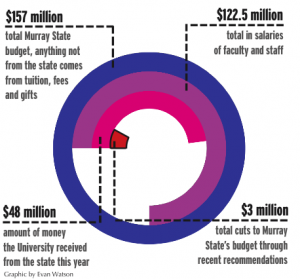In the midst of releasing potential University budget changes, Interim President Tim Miller assured students he does not want cuts to affect them.

But increased parking tag prices, a new fee for Health Services and additional tuition for students taking an overloaded semester are a few of the preliminary recommendations that could hit students where it hurts.
“Anything I recommend (to the Board of Regents) hopefully is not going to hurt enrollment or student services,” Miller said.
The recommendations were emailed to all students, faculty and staff last week as an effort by the President’s Office to remain as transparent as possible. The list was developed by a subcommittee charged with examining older recommendations eliminated by the board and finding new areas where the University can save money.
A few of the major changes include:
- Restructure to move from four vice presidents to three, with a change in salary and benefits.
- Reduce academic colleges and schools by one.
- Increase annual parking tag fee from $55 to $75 and $35 to $45 for all students and employees.
- Merge Career Services and the Center for Academic Advising.
- Reduce CFSB budget and replace lost funds with a parking fee for paid events.
- Eliminate free parking tags.
- Examine the feasibility of additional tuition for those overload undergraduates approved to take 19 hours and above.
- Reduce athletics budget and efficiencies in student support activities.
- Eliminate the president’s chief of staff position.
- Evaluate the possibility of adding a per-semester Health Services charge of $12.50 for faculty and staff as well as the main campus students.
- Assess the efficiency of commuter parking on campus; consider breaking the red tags into three or four colors and make the purchasing of tags based on seniority.
These recommendations came after the University was forced to examine an additional expenditure of $3 million originally unaccounted for. This change in the budget was partially due to a $700,000 increase in health insurance costs.
Although the original plan was to present recommendations to the Board of Regents in December for approval, it will only look over the preliminary list and further action will be taken in March.
Student Regent and Student Government Association President Jeremiah Johnson said some of the recommendations will cost students extra money, and those proposals need to be looked at closely and re-evaluated.
“I won’t support anything that will cost students a lot of extra money without increasing the services we’re already getting,” Johnson said.
Johnson said he thinks parking changes will create an uproar among the student body. He does not think the price of tags should increase since students are already paying for city stickers.
Grant Grissom, chair of the SGA judicial board, agrees that prices should not increase.
Among other responsibilities, Grissom and the judicial board sift through and address all of the appeals for parking tickets.
He did say students should keep in mind that the cost of parking at Murray State is significantly cheaper than at other schools. Grissom also noted that the furthest lot at Hamilton Field is the same distance from the Quad that Hart Residential College is.
“I will not support anything that increases burdens on students,” Grissom said. “But at the same time, we also need to be aware of how lucky we are in terms of what we do pay.”
Another recommendation highlights the possibility of moving to a four-day work week during the summer. Miller said this would help save utility money, although it may affect some faculty salaries.
Another proposal would be to close down a few buildings during the summer and only teach in two or three. Miller said faculty may not like this proposal because their office may not be in the same building as the classroom.
“They may not like that, but at least they still have a job,” he said.
Miller said he sent emails with the recommendations and updates on meetings to assure transparency in the system.
“Transparency allows students to be more opinionated and help direct the University in the right direction,” Johnson said. “It’s not the board, or just the president; everyone’s working together and watching out for each other.”
Story by Lexy Gross, Editor-in-Chief

